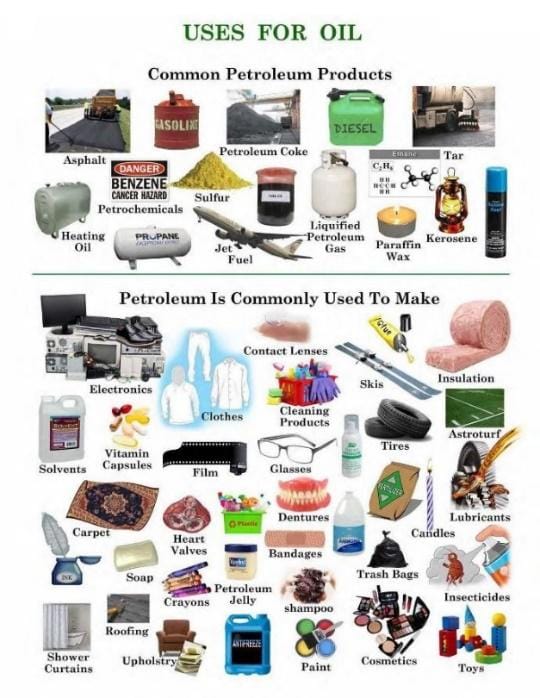Table of Contents
Ronald Stein
Ronald Stein is an engineer, senior policy advisor on energy literacy for CFACT and co-author of the Pulitzer Prize nominated book Clean Energy Exploitations.

The few wealthy countries pursuing the generation of electricity from wind turbines and solar panels while simultaneously moving to rid the world of fossil fuels have short memories of petrochemical products and human ingenuity being the reasons for the world populating from one to eight billion in less than 200 years.
Renewables may be able to generate intermittent electricity from breezes and sunshine, but they cannot replace what is manufactured from fossil fuels [and is] demanded by lifestyles and economies around the world.
Efforts to cease the use of crude oil will be the greatest threat to civilization, not climate change, and lead the world to an era of guaranteed extreme shortages like we had in the decarbonized world in the 1800s without fossil fuel products. This pursuit of renewables without fossil fuels can only lead us back to shorter life spans, diseases, malnutrition and weather-related deaths resulting from the elimination of the products from fossil fuels that are now benefiting society.
If the zero-emission cult succeeds in ridding the world of fossil fuels, wind turbines and solar panels may be able to generate intermittent electricity, but they cannot manufacture anything. Electricity from breezes and sunshine may be renewable, but it’s not reliable. Again, short memories about the zero-emission society that we already had in the 1800s…
Everything that needs electricity is made with the oil derivatives manufactured from crude oil. Let’s take a look at a few infrastructures and products that did not exist before the 1800s, that now need electricity to operate:
- Transportation
- Hospitals
- Medical equipment
- Appliances
- Electronics
- Telecommunications
- Communications systems
- Space programs
- Heating and ventilating
- Military
The challenge for the renewable movement is that refineries only exist economically to manufacture gasoline and diesel fuels for the global fleet of road vehicles in 2022 that numbered about 1.446 billion, that’s with a “B”.
Refineries are not economically viable JUST to manufacture bunker fuels for ships, aviation fuels for planes and oil derivatives that are the basis of more than 6,000 products that are now demanded by societies and economies.
The future does not bode well as 20 per cent of the 700 worldwide refineries are projected to close in the next five years […] that will result in less manufacturing to meet growing demands of ships, jets and the derivatives needed for all the products demanded by society. Further inflation and shortages in perpetuity are guaranteed.
- [T]he proverb “you can’t have your cake and eat it too” tells us that you can’t rid the world of fossil fuels and continue to enjoy the products and fuels manufactured from fossil fuels.
Of the current huge global fleet of vehicles, only 12 million were electric vehicles (EV) in 2021. Thus, less than one per cent of the worldwide road vehicle fleet were EVs, and more than 99 per cent of the global fleet was “yet to be replaced”.
As the electronification of the vehicle fleet moves forward to diminish the 99 per cent “yet to be replaced”, there will be insufficient refinery manufacturing to support the IMPORTANT demands of ships, jets and the derivatives needed for all the products demanded by society.
Efforts to cease the use of crude oil could be the greatest threat to civilization, not climate change, and lead the world to an era of guaranteed extreme shortages of fossil fuel products, like we had in the decarbonized world in the 1800s, may result in billions of fatalities from diseases, malnutrition and weather-related deaths trying to live without the more than 6,000 products currently benefiting society.
Today, we have the fuels for the 50,000 jets moving people and products and more than 50,000 merchant ships for global trade flows […] We also have the manufactured fuels for the vehicle population dominated by truck registrations, and the military and space programs, which are needed to support the worldwide efforts to feed those eight billion on this earth.
Just a few hundred years ago, before oil, the world was unspoiled, decarbonized and dominated by mother nature and the wild animal kingdom. There was no coal-fired power plants, nor natural gas power plants and the Beverly Hillbillies had not yet discovered oil. There were fewer humans competing with the animals due to humanity’s limited ability to survive what mother nature provided. Before oil, life was hard and dirty, with many weather- and disease-related deaths.
There are now eight billion of us, with most people living much longer and more prosperous lives than the one billion people who were around when fossil fuels use took off after the mid 1800s. Moreover, the richer we are, the greener most parts of the planet become.
As a reminder, we had a net-zero emissions society in the 1800s when there were no coal-fired power plants, no natural-gas power plants and no crude oil to be manufactured at refineries into usable products.
Thus, without a planned replacement for what is now manufactured from fossil fuels, we may get to the net-zero emissions society but a few billion fewer people on this planet will die from starvation, diseases and weather-related fatalities.









